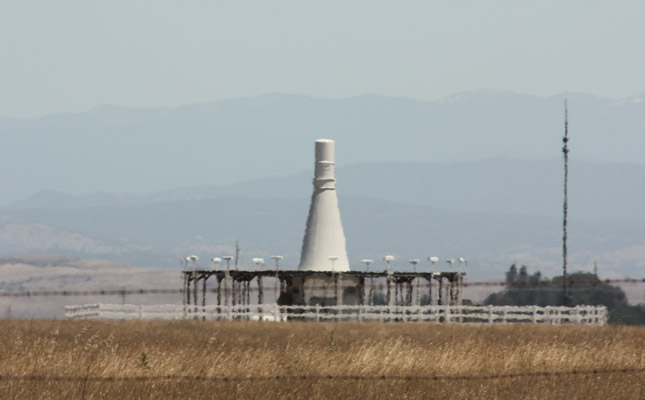The monthly meeting of the Madera Irrigation District board of directors was held June 13, 2023, at the MID offices on the south side of Madera. The open meeting was called to order at 2:07 p.m. by President Jim Erickson after the scheduled one-hour closed session. The agenda for that session said there would be consideration with counsel of six items of existing litigation and two pending matters. The performance evaluation of Assistant General Manager Dina Nolan was also listed. There was no reportable action.
Following the call to order came the pledge and Erickson said he would not be participating in the consideration of land purchase on the agenda due to a potential conflict of interest. Public comment was invited but there was a short delay to get the Zoom connection fully up and running. Speaking first was Jennifer Peters who appeared with her father, Robert Markarian. They had recently completed a recharge basin on their farm west of Madera assisted by an NRC grant and the MID incentive program. They wanted to speak about water pricing and availability but were invited to hold their comments until an agenda item regarding recharge basin incentives.
Board of Equalization
The board moved into its scheduled public hearing acting as the board of equalization to hear any matters regarding assessments on property in the District. Controller Jennifer Furstenberg presented the tax roll as it had been provided by the County which identified changes in ownership. The assessed value of land in the District amounts to over six million dollars and this year assessment rates will remain unchanged. For example, on agricultural land in the original district with water service available, the recorded full cash value per acre is $780, the assessed value is $235 and the general assessment is $18.40. Director Carl Janzen noted how many property sales there are each year and that he’d be happy to buy all the land in the Districted at $1000 per acre, referring to the low assessed values compared to current real estate prices. There were no public comments, and it was stated that the Board would meet on June 16 at 2 p.m. to formally adopt the tax roll.
acre is $780, the assessed value is $235 and the general assessment is $18.40. Director Carl Janzen noted how many property sales there are each year and that he’d be happy to buy all the land in the Districted at $1000 per acre, referring to the low assessed values compared to current real estate prices. There were no public comments, and it was stated that the Board would meet on June 16 at 2 p.m. to formally adopt the tax roll.
GSA
The board moved into the GSA agenda at 2:20 p.m. Assistant GM Nolan cited the news release that MID had issued on May 3, highlighting the successful partnership on recharge projects with the city of Madera. Working to assist the city during spring rains, she said recharge had totaled some 685 AF. She said the agenda for the regular board meeting that was to be considered shortly included the incentive for on-farm recharge programs.
MID
With that, the group reconvened as the MID board, approving the consent agenda without discussion which included approval of the April 18 meeting minutes, the warrant of bills to be paid through May 31, totaling $1,842,913.50, and the financial reports for March and April 2023.
Moving on to staff reports, the board heard from Charles Contreras, head of the District’s Department of Engineering, Operations and Maintenance. His nine-page report included detailed descriptions and photos of work done across the district during the past month. He said 38 turnouts had been made operational, including 24 that had not been used since 2001 and 14 with no usage history at all. On this topic, Assistant GM Nolan said that it’s great that more landowners can use surface water, and some haven’t used it for as long as  20 years. Director David Loquaci talked about the challenges of managing demand for scheduling, flows, and the cost of putting in turnouts with meters. Contreras said that even with more money in the budget, often there were waits for delivery of this equipment. He documented repairs of pipeline leaks, always ongoing across the District. With canals full, trash buildups are a continuing issue at junctions and turnouts. There was also discussion of moss and algae growth, especially around drip irrigation facilities. Contreras urged that landowners contact his office as soon as buildups are noted so there can be mitigation. His report also included details of work performed in the welding shop and on the District’s vehicles and equipment. He routinely reports pesticide and herbicide use as well as required. The department will have an intern this summer from Fresno State.
20 years. Director David Loquaci talked about the challenges of managing demand for scheduling, flows, and the cost of putting in turnouts with meters. Contreras said that even with more money in the budget, often there were waits for delivery of this equipment. He documented repairs of pipeline leaks, always ongoing across the District. With canals full, trash buildups are a continuing issue at junctions and turnouts. There was also discussion of moss and algae growth, especially around drip irrigation facilities. Contreras urged that landowners contact his office as soon as buildups are noted so there can be mitigation. His report also included details of work performed in the welding shop and on the District’s vehicles and equipment. He routinely reports pesticide and herbicide use as well as required. The department will have an intern this summer from Fresno State.
Nolan said she wanted to give a “shout out” to Controller Furstenburg for the employee benefit audit that had been completed. Department staff had pulled out the records and met with every employee regarding their benefit packages, giving many a new appreciation for what the District provides its workers. GM Tom Greci said in his case as an example, even though he had had no life changes, there were a number of items in his record that had to be brought up to date.
GM Report
Greci then moved into his GM report announcing that the July board meeting is canceled, considering vacation schedules and what’s been accomplished to date this season. He said there will be a meeting of the Madera Chowchilla Water & Power Authority board on July 26. While Madera Lake is now dry, he said the required emergency action plan has finally been completed and approved. He was pleased to announce that the Standard & Poor’s credit rating had been now labeled “stable” after discussions with staff about the drought and current water supplies.
Regarding water supply, he said that it’s a great year for new users on the system and that the Madera Canal is being kept at capacity, with anything extra going to the Hidden Unit. He said the Friant season is expected to end in July, reducing releases at the dam to fill Millerton Lake. He said that with the rain and cool weather in the mountains, snowmelt had been steady. He said he’s hopeful that at the end of the irrigation season there will be water available that can be priced for recharge. He said the Friant power plants are running now at full capacity with periodic routine flushing of the filters. He said District basins have been taken off line from time to time to make water available for irrigation, which is the best thing.
He pointed out that the District’s recharge program has been highlighted in various local media, including tours of the Markarian on-farm basin. He says it has been shown how  surface water use allows pumping to be shut down. Assembly Member Esmeralda Soria has toured the District emphasizing the investment in water is for the Central Valley community as a whole. Greci thanked all the board members for attending the ACWA conference and invited questions.
surface water use allows pumping to be shut down. Assembly Member Esmeralda Soria has toured the District emphasizing the investment in water is for the Central Valley community as a whole. Greci thanked all the board members for attending the ACWA conference and invited questions.
Director Brian Davis asked if there had been any reevaluation of the rate of snowmelt. Greci said over flights have shown that the May totals were not as high as some years. President Ericson, who is the current chair of the Friant Water Authority, said Millerton Lake is at 300,000 AF and the high is expected in July.
New Business
The first item was the recharge incentive with Nolan reminding the group that in 2022, the board had approved offering an incentive to farmers to obtain NRCS funding for recharge basins with the District offering a 15 percent addition to qualifying grants. A budget of $100,000 had been set but only $62,000 had been used. A resolution was presented that would spend the remaining $38,000 for another round of incentives. She presented the application details with a June 30 deadline. Applicants must document the NRCS grant for a dedicated recharge basin and the resulting basin must have an individual metered turnout. The basin must be ready, and the landowner must be ready to receive District water this year.
presented that would spend the remaining $38,000 for another round of incentives. She presented the application details with a June 30 deadline. Applicants must document the NRCS grant for a dedicated recharge basin and the resulting basin must have an individual metered turnout. The basin must be ready, and the landowner must be ready to receive District water this year.
At this point, Jeannie Peters was given the floor. She manages the bookkeeping and all administrative matters for the Markarian family farm. She first asked if the credit that the farm received could be used for the entire 80-acre parcel on which their 40-acre basin was situated. She was told she could. She explained that the basin was now dry after being fully used earlier in the spring with the low price and then free recharge water from the District. She asked if more no-cost water could be made available since the basin was fully prepared to handle it. She said that if the District needed this additional capacity, the family would be glad to work with them. She said it was not affordable for them to fill the basin with water now priced for irrigation at $72.50 / AF.
low price and then free recharge water from the District. She asked if more no-cost water could be made available since the basin was fully prepared to handle it. She said that if the District needed this additional capacity, the family would be glad to work with them. She said it was not affordable for them to fill the basin with water now priced for irrigation at $72.50 / AF.
Discussion ensued with Director Loquaci pointing out that during the growing season, District water should go to crops, not to recharge. He said the real value of basins is early and late in wet years. He said, “You have a hole, and you want to fill it… we get that.” He said maybe the District in real wet years should find a way to run water to such basins, when the board decides water is available. But he noted that in his view policy should not be made for the extremes of either wet years or dry.
Jeannie’s father-in-law, Robert Markarian, said he had been farming for 60 years and now had gotten on board with the idea of recharge. He said they appreciated the help they had received from the District for their project, and they would be applying for this funding being discussed.
Director Davis added he sees the long term opportunity for recharge, with Loquaci emphasizing that the best way to save the aquifer is for farmers to use surface water and not run pumps. With no further discussion, the board unanimously passed the resolution providing for the next round of incentive payments.
Budget Matters
While everyone is delighted with all the water this year, it does bring some budget realities. The District’s 2023 budget had been adopted in December after three years of drought and before the winter rains. A resolution was presented asking the board to make increases in a number of expense categories due to the increase in deliveries. Among them, the budget  for water purchases doubled from $8.5 million to $17 million. More money is also needed for equipment purchases and repairs, system maintenance and overtime among other things. While some planned expenditures will be delayed, increased water sales will be the biggest source for meeting these higher costs. The motion to approve the budget adjustments was passed unanimously on a roll call vote.
for water purchases doubled from $8.5 million to $17 million. More money is also needed for equipment purchases and repairs, system maintenance and overtime among other things. While some planned expenditures will be delayed, increased water sales will be the biggest source for meeting these higher costs. The motion to approve the budget adjustments was passed unanimously on a roll call vote.
President Erickson excused himself when the next item was brought up, consideration of the purchase of a parcel of 44 acres from private landowners to develop a recharge basin. Vice President Carl Janzen took the gavel. A number of owners had submitted proposed sales responding to the District’s earlier request for proposals posted on April 14 with a submittal deadline of May 26. Staff and directors had evaluated the various parcels with this one, 44.62 acres from the Lilles Family Trust determined to be the best of the lot. Surrounded by District facilities, the soils look good for recharge and the land has a good bit of fall so gravity can be used to move water. The agreed upon price is $1,428,000. GM Greci said there was already $850,000 in the budget for land acquisition, and he said one million dollars would be taken from reserves for land clearing and the removal of a couple of old buildings. Director Loquaci pointed out that the land will be easily cleared of young almond trees and old vines, saying it’s a perfect location “right where we need it,” surrounded by canals and above the city’s storm drain. He moved to approve the purchase with Director Tim DaSilva offering the second. Loquaci further commented that this is not a spur of the moment decision and that land acquisition for recharge has been part of the District’s long term planning. GM Greci noted that this is long term thinking, taking land out of production and putting in recharge for the benefit of the District. The motion passed and the deal is expected to close in late August or early September.
Surrounded by District facilities, the soils look good for recharge and the land has a good bit of fall so gravity can be used to move water. The agreed upon price is $1,428,000. GM Greci said there was already $850,000 in the budget for land acquisition, and he said one million dollars would be taken from reserves for land clearing and the removal of a couple of old buildings. Director Loquaci pointed out that the land will be easily cleared of young almond trees and old vines, saying it’s a perfect location “right where we need it,” surrounded by canals and above the city’s storm drain. He moved to approve the purchase with Director Tim DaSilva offering the second. Loquaci further commented that this is not a spur of the moment decision and that land acquisition for recharge has been part of the District’s long term planning. GM Greci noted that this is long term thinking, taking land out of production and putting in recharge for the benefit of the District. The motion passed and the deal is expected to close in late August or early September.
Janzen wanted to keep the gavel for the next item, a bit of housekeeping to update bylaws for the Regional Water Management Group. Janzen is a board member here and said that while the group started in 2008 or 2009 with only a few attending, more became involved when Zoom was used for meeting as COVID hit. The bylaw change allows for some administrative help from a formal “group coordinator,” which the state requires for grant applications.
The final item of new business was consideration of policy to handle requests for providing water or wheeling services for lands outside the District boundaries. Subject to water availability, the District has supplied water or wheeling services to those outside under one-year terms, GM Greci began by saying since it is beneficial to bring in wheeled water to the District and staff had been working on drafting rules that might apply to longer term arrangements with some property owners. He said that under some circumstances, the Bureau of Reclamation has had to be involved and environmental review had been required. Sometimes the District had to guarantee a supply even when water was not readily available. With these complexities, the staff invited Directors Erickson and Loquaci to consider these issues as well. After considering the details, the decision was to have only year to year agreements and not to enter into long term arrangements for out of district landowners.
arrangements with some property owners. He said that under some circumstances, the Bureau of Reclamation has had to be involved and environmental review had been required. Sometimes the District had to guarantee a supply even when water was not readily available. With these complexities, the staff invited Directors Erickson and Loquaci to consider these issues as well. After considering the details, the decision was to have only year to year agreements and not to enter into long term arrangements for out of district landowners.
In this meeting, Erickson said, “We have a district to run and promising they will get water if they [out of district owners] put in facilities” creates too much liability. Loquaci said, “In today’s climate, water rights are being threatened every day. Our job is to acquire and bring in water for our growers. If we can occasionally supply water to out of district lands, I’m all for it by bringing in water into the district.” But he went on the say, “The next owner might think they have some right to District water.” For that reason, he said he supports annual arrangements but is “leery” of having long term agreements. He did say he did not oppose longer term agreements with other GSAs or public entities. Director Janzen said it’s not the second owner but the third owner who might believe there was a permanent right.
Greci concluded by saying while formal environmental review is no longer required and the Bureau is working to streamline these requests, it still can be a challenge.
At this point, Roy Catania, in the meeting apparently representing a grower or firm who had apparently been looking for a longer term deal, said the intent was never to have a water right. He said there was no intent to acquire a right just because we have the facilities. He said the farm wanted to put in a turnout and pay the going price. He said the owner knows that MID is in charge. If there is water, that’s fine. If not, he understands.
Director DaSilva said he agreed with the current arrangements for only annual agreements. Director Davis says while longer term arrangements can create issues, temporary agreements can accomplish the same thing.
Greci said the staff is looking for direction. Counsel John Kinsey summarized the discussion saying he understands the District is not interested in entering into long term agreements but would consider longer term agreements with public agencies. Greci said that we didn’t arrive here quickly and lots of consideration has been given to these issues. After a comment on Zoom that we couldn’t catch, the board approved this policy on a voice vote.
Concluding the meeting, directors each offered a report. DaSilva said the at the RMC meeting, it was noted that a fish screen will be placed on the Sacramento Dam in 2024 and that there was lots of discussion about recharge and stopping subsidence.
Davis said he felt that ACWA had a good conference and was glad to see everyone there happy and excited about ample water this year. His energy committee has said there will be lots of challenges complying with the requirements coming for electric vehicles. He said there had also been discussion of water rights.
Janzen said that the folks providing ACWA insurances to organizations have forecast ten percent rate increases for the next three or four years. He said the generators at Friant are working well and the new transformer is doing all we hoped. He said payments to Authority members will begin as soon as the Authority’s million dollar reserve fund has been restored.
members will begin as soon as the Authority’s million dollar reserve fund has been restored.
Loquaci said the city has been working great with us and is buying water for the municipal golf course. He also said that Madera County has not asked the District to put a single drop of water in its basin.
Erickson said that at ACWA he had spent most of his time in Friant meetings. He said Friant is busy with water rights at the state level working with DNR and state representatives. He said we need to pay attention to this issue. He concluded saying, “The Bureau is not real happy with us.” He said Friant wants specific rules rather than staff interpretations when it comes to things like paying for Friant Canal repairs.
said we need to pay attention to this issue. He concluded saying, “The Bureau is not real happy with us.” He said Friant wants specific rules rather than staff interpretations when it comes to things like paying for Friant Canal repairs.
The open meeting was recessed at 4:08 p.m. with the board moving back into closed session.
DISCLAIMER OF RESPONSIBILITY; Waterwrights strives to provide clients with the most complete, up-to-date, and accurate information available. Nevertheless, Waterwrights does not serve as a guarantor of the accuracy or completeness of the information provided, and specifically disclaims any and all responsibility for information that is not accurate, up-to-date, or complete. Waterwrights’ clients therefore rely on the accuracy, completeness and timeliness of information from Waterwrights entirely at their own risk. The opinions expressed in this report are those of the author and do not represent any advertisers or third parties.
does not serve as a guarantor of the accuracy or completeness of the information provided, and specifically disclaims any and all responsibility for information that is not accurate, up-to-date, or complete. Waterwrights’ clients therefore rely on the accuracy, completeness and timeliness of information from Waterwrights entirely at their own risk. The opinions expressed in this report are those of the author and do not represent any advertisers or third parties.
ALL RIGHTS RESERVED. Copyright 2022 by WaterWrights.net
Madera Irrigation District – 12152 Road 28 ¼ Madera, CA 93637 559/673-3514
Staff: General Manager -Thomas Greci, Assistant GM – Dina Nolan
Board: Jim Erickson, Chair; Tim DaSilva, Brian Davis, Carl Janzen and Dave Loquaci
HISTORY: From www.madera-id.org The Madera Irrigation District (MID or District) encompasses an area of approximately 139,665 acres. MID operates a primarily gravity irrigation distribution system with approximately 300 miles of open flow canal systems as well as 150 miles of large diameter pipelines.
The District has a Central Valley Project (CVP) repayment contract with United States Bureau of Reclamation (USBR) providing up to 85,000 acre feet (AF) of Class 1 and 186,000 AF of Class 2 water per year from the Friant Division (Millerton Lake). The CVP water is released from Millerton Lake through the Friant Dam, and then conveyed through the Madera Canal for delivery into the District’s service area. The District also entered into a CVP repayment contract with the USBR for the yield from the Hidden Unit (Hensley Lake). Under the Hidden Unit contract, the average annual supply available to the District is approximately 24,000 AF per year.
DWR SGMA # 5-022.06































